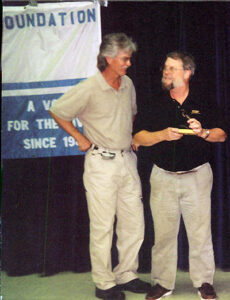Charlie Adams
40 Years, 40 Stories

CHARLIE ADAMS, GREENVILLE
“We were activists. We were rabblerousers, and we didn’t give a damn. A lot of people didn’t like us. That was then, and we managed to get away with it without being shot. And we’re still here.”
Charlie Adams laughs when he talks about how the founders of the Pamlico-Tar River Foundation were perceived by the general public back in 1981. Their ideas weren’t popular, even though most people paying attention could see the issues facing the Pamlico River.
“At that time, we thought it was sedimentation, and just ignorance, particularly non-point source pollution and point-source pollution — that was awful back then,” Adams said. “Of course, the Texasgulf people wanted a new mine permit and, boy, did we put them through their paces. Initially, it was kind of something that we just felt we had to do. Texasgulf was going to take the freshwater under the ground and turn our river into something it wasn’t. And we fought them tooth and nail.”
It was one of the issues that galvanized river-lovers, gathering a community of likeminded people together to start a grassroots movement on the banks of the Pamlico. Ultimately, PTRF would be a major factor in major modifications to the Texasgulf operation, including a tremendous reduction in the discharge of process wastewater into the river, and the implementation of the company’s wastewater recycling system.
What brought them together was their passion for the river.
“Honest to God, we never had a meeting that lasted less than two hours,” Adams laughed. “Somebody said ‘Let’s have an oyster roast,’ so we did; somebody said, ‘Let’s do a newsletter,’ so we did; somebody said, ‘Do a slideshow of all the problems with the river,’ so we did. I am proud that, most of all, that we did all that.”
It was brainstorming how to make the public aware of PTRF’s mission that prompted the first PTRF Oyster Roast.
“Everybody likes oysters, but people rarely think of where they come from,” Adams said. “When we cranked up the Oyster Roast in 1986 or ’87, I think that was the key to getting us off the ground.”
The Oyster Roast became a major fundraiser for PTRF and remains one today for Sound Rivers, in addition to being a signature annual event for the City of Washington.
And it was brainstorming how to educate current and future generations about local waterways and the threats they face that prompted PTRF founders and members to plant the seed for an estuarine resource center. The PTRF board, at the time, asked for, and received funding, through the Albemarle-Pamlico National Estuary Partnership for a feasibility study for a one-of-a-kind museum.
“We managed to snooker away a few dollars for a proposal to do the Estuarium. Anyway, long story, short — we did the Estuarium,” Adams laughed.
But some people’s perception of PTRF as “rabblerousers” deterred other, much-needed supporters from signing on with the project, according to Adams.
“There was a resistance, and when we finally had the Chamber of Commerce on board, if we had to take a back seat, then that’s what we did,” Adams said.
Passion for the Pamlico, education about the importance of its health and a lot of good intentions were the foundations of the organization that has become a powerful and respected advocate for waterways covering nearly 24% of the state of North Carolina.
“We tried to put together a group of people who represented the whole ball of wax that goes into the why you love the river — it ain’t about a bunch of white people with houses on the riverside. It’s also about the people having sufficient fishing up in Chicod Creek,” Adams said.
Adams own Pamlico roots go back to the river cottage his grandfather built on Broad Creek in 1954. He has no recollection of when he met the boys who would later become the founders of PTRF in 1981, but they all met on the river — fishing, swimming, boating, skiing through the summers — and he was a natural fit for the cause. He still is today.
“Swimming, fishing, all those things that drew me to it, a gorgeous May afternoon on my boat, I wouldn’t give it up for nothing,” Adams said. “Thank the Lord, somebody heard us.”
